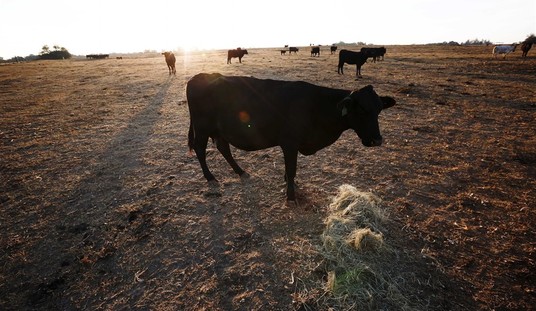No reason to doubt him. They’ve been fighting to retake Tikrit for more than a week with little progress.
This sounds like a job for — well, for Iran, actually.
“If you’re asking me, will the Iraqis at some point be able to go back on the offensive to recapture the part of Iraq that they’ve lost, I think that’s a really broad campaign quality question. Probably not by themselves,” Dempsey said. “Does it mean we would have to provide kinetic support? I’m not suggesting that that’s the direction this is headed. But, at any military campaign, you would want to develop multiple access to squeeze ISIL. You’d like to squeeze them from the south and west, you’d like to squeeze them the north, and you’d like to squeeze them from Baghdad. And that’s a campaign that has to be developed.”
“But the first step in developing that campaign is to determine whether we have a reliable Iraqi partner that is committed to growing their country into something that all Iraqis will be willing to participate in. If the answer to that is no, then the future is pretty bleak.”
Translation: If you want U.S. help, it’s time to transition from Maliki to a PM less despised by Sunnis and Kurds. Why would Iran agree to that, though? The consensus, which includes Dempsey himself, seems to be that Baghdad will hold. There are too many Shiites in the capital for ISIS to handle, especially when they’re spread thin trying to hold the Sunni areas they’ve already taken. The most ISIS can probably hope for in Baghdad is to seize some Sunni neighborhoods temporarily and to bleed the Shiites with a terror campaign. From Iran’s perspective, though, aren’t you better off with a Shiite rump state in Baghdad and the south that’s controlled by a proxy like Maliki than with a “unified” Iraq controlled by someone less loyal? The Kurds are probably gone for good anyway, so all you’d be getting in return for making a concession on the new prime minister is nominal unification between the Shiite and Sunni areas. Why not let the Sunnis go and trust that the U.S., the Saudis, Jordan, Turkey, and Kurdistan will keep the jihadis there in check? As long as the Saudis don’t threaten Iran by occupying Anbar province (which may be more likely today than it was yesterday), they can probably live with that area’s independence, no?
Note what Dempsey says too about squeezing ISIS from all directions — the west (Jordan), the south (Saudi Arabia), the north (Turkey and Kurdistan), and Baghdad (Iraqi Shiites and Iran). Hard to imagine those five actors cooperating on a battle plan, but maybe they don’t need formal cooperation. U.S. air assets could attack from Jordan and Saudi Arabia, the peshmerga could push south, and the Shiites could push west. Maybe, in exchange for their help, the Kurds will gain support for formal independence from the other key actors. And once ISIS has been driven back into Syria, Iraq’s Sunni tribesmen can be bought off with Saudi money and promises of their own de facto independence to make sure ISIS has a harder time the next time it tries to come south. Exit question: You trust Iraq’s Shiites to let go of the oil fields in Sunni territory, don’t you?
Update: On second thought, letting Sunnistan go maybe isn’t such an easy call after all.








Join the conversation as a VIP Member